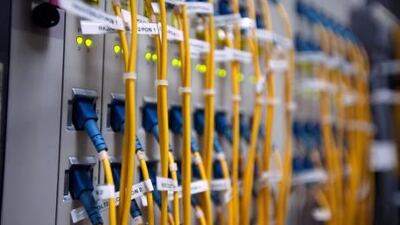DUBAI // Aircraft were going to fall from the sky, prison doors were going to open and Russian nuclear weapons were going to launch … or so they said.
But as the clocks struck midnight on January 1 2000, the predicted global cataclysm from the Millennium Bug resolutely failed to happen.
But more than a decade later, many experts believe there are still reasons to be concerned for the fate of the world's IT infrastructure.
Deep in the inner workings of the internet, a fundamental change is afoot that could disrupt the whole network, affecting users, businesses and technicians alike.
And today is crunch day, when the guardians of the internet will find out whether their solution is ready for prime time.
If not, billions of computer users around the globe could find themselves temporarily starved of information.
"Potentially, it could be like the Y2K bug," said Steven Winstanley, the chief operating officer of Ankabut, a networking organisation set up by Khalifa University.
"It's something which is going to affect everyone who connects to the internet via a computer or phone. We are looking into the abyss right now and in terms of the future of networking, it's very scary.
"But if there's a lot of people who understand what's going on, maybe people will do the background work and sort the systems out."
The problem lies with Internet Protocol (IP) addresses - the unique numerical labels given to devices when they connect to a network.
The current system allows for about 4.3 billion possible address combinations that are assigned by a central authority to regional authorities, and from there to individual internet service providers - companies such as Etisalat and du.
The first murmuring of trouble began decades ago, as experts began to realise the pool of unallocated IP addresses was rapidly dwindling, and those 4.3 billion addresses would soon be nowhere near enough.
In January this year, the central authority - the Internet Assigned Numbers Authority - distributed its last batch of addresses.
They are still being assigned by local authorities to users and companies, but when they are gone, that will be it. If you want to hook a new computer to the net, tough. If you want to start a new business or drag your village into the 21st century, too bad.
The answer, fortunately, is already in place. The problem is that hardly anyone uses it.
In a bid to fend off disruption, governments and organisations around the world are hoping to introduce a new type of IP address.
Mr Winstanley compares it with London in the 1990s, when a growing population meant the 01 phone prefix for the city had to be split and expanded not just once, but twice.
The plan is that the new system, IP version 6 (IPv6), will work alongside the current system, IPv4.
But less than 1 per cent of websites are now IPv6 compatible. Anyone trying to use IPv6 for most of the internet will see only an error page.
Today, leading companies such as Google, Facebook and Yahoo will join with governments in a "stress test" of the new system, known as World IPv6 Day and organised by the Internet Society in Virginia.
They will enable IPv6 on their websites, allowing users of the new IP template to connect to their pages. In the UAE, the Telecommunications Regulatory Authority (TRA) is taking part. "The TRA is proud to take part in leading such an initiative and to be the first production website hosted in the UAE which is accessible globally via IPv6 address scheme," said Mohamed Nasser al Ghanim, the director general of the TRA.
"With the recent exhaustion of IPv4 address allocations, we are confident that the IPv6 will open a new chapter in the field of communications, which will allow a large amount of people and devices to be connected to the internet."
The US government plans to make all of its official websites accessible to IPv6 by next year.
"There's still a lack of awareness, but we're embracing it and trying to make it happen," said Peter Tseronis, the chairman of the US Chief Information Officers Council's IPv6 task force. "That's the plan under the current administration of the White House.
"It's a heavily involved re-networking of our infrastructure that has never had to undergo anything like that before. Some people wonder how they can even begin architecting something like that."
But Mr Winstanley believes it will be at least three to five years before IPv6 is widely adopted. Until then, he predicts chaos.
"This slow migration has to begin," he said. "But because of the momentum and adoption of IPv4, it's going to take a long time to switch over to IPv6.
"The trouble is, IPv4 will stop a lot shorter than the IPv6 will start. In the time before that happens, it's going to be digital anarchy."
As for today, despite uncertainty about the consequences of suddenly accepting traffic from a whole new system of addresses, Mr Winstanley is optimistic.
"What does it mean to the average user?" he asks. "Probably not a hill of beans, to be honest."

